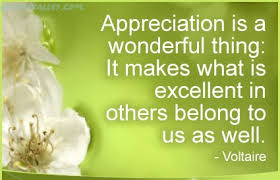Category: relationship management
5 Tenets of Appreciating Others

1. Today, I’ll talk to you about the art of appreciation. Develop the art of appreciating others. You might ask- Art of Appreciation! Where is the need?
To this I say, the need was never as important as it is today. The need to build good relations with people who are concerned, who are connected with you, is critical. In the very competitive world, your progress, even your survival needs help of others. The art of appreciation is the sharpest tool that will be very handy in building good relations. So better acquire this art sooner than later.

2. Next question that might confuse you is: what to appreciate? Well, any accomplishment, a victory, big or small, completion of an important project, qualifying an exam are- all occasions where you require to appreciation. More than that, if you have received any help that deserves appreciation. It deserves recognition and saying ‘thank you’. Thank you is also an appreciation. The person concerned will be happy. And, of course, happiness given always returns often manifold.

3. When to appreciate? As soon as you get the good news, the sooner the better. The achiever will admire your speed. Be the first one. If you get the news late don’t think “now it’s too late’. Remember better late than never! Your reward will be warmer reciprocation. More importantly, you come closer, make a greater stronger bond.

4. Where to appreciate? Anywhere you meet your friend first time after the achievement. If it is your colleagues, you may do it in the office. If you want bigger celebration say it, and do it! Share the joy.
5. How to appreciate? Well, there is the rub. Say it with most appropriate words. Never overdo it. And you need not underplay. Identify the achievement; recognize the effort that would have gone in it. And talk about it. And when you get help, it’s your greater duty to thank the person. Say thank you, warmly. Send ‘Thanks’ message. When occasion deserves, Extend an invite. Achievements may also be congratulated with flowers. Keep on fine tuning your art as the fine notes of music, and keep on enjoying the results.
Thanks
‘Voice Modulation’
We hear a lot about voice modulation in the age of public presentations.
What is modulation? And why is it so important?
Voice Modulation is your ability, rather, talent to bring in variance in pace, pause, pitch, emphasis on the key word and the tone. Unless you modulate your voice while speaking to a group or even a lone listener, the chances are that you speech will not be effective at all. We have often seen some members of the audience dozing away while the speaker continues his/her speech. Now, I will explain- pace, pause, pitch, emphasis on the key word and the tone.
Pace: if you speak very fast you will not be understood but, if you speak very slowly you tend to become dull and listeners will not like to listen to you. However, when you speak with a medium speech, though audience can understand you but the same pace of your words will render your speech monotonous.
Pause: Just as in written text you have coma, full stop, paragraph and other punctuation marks, your speech too must reflect the same by means of pauses of different durations. This will make the speech effective.
Pitch: It is the note on which you speak. While attending a solemn meeting you cannot speak on higher pitch. But at the same time if the commentator of a football match speaks at a low pitch, nobody will like to listen to him.
Emphasis on the key word: Just as you get unwanted results if you Google a wrong key word, different meaning will be conveyed by the same sentence when you emphasis a wrong word.
Tone: Tone is most dicey. It is easy to control the words and the sentences. But it is very difficult to control the tone. Tone represents the emotions with which you speak. Often times, due to inappropriate tone the speaker lands into trouble.
Are you listening?
While talking on the telephone often you ask the listener – “Are you Listening?” If there is no sound of response such as ‘hmm’, ‘yes’, ‘please go ahead’, ‘I understand’, etc. you tend to feel that your words are falling on deaf ears. More so when you are negotiating on the telephone.
But what happens when you talk face to face?
The significance of your words is reduced to just 10 to 15%. ‘How you say it?’ – becomes more important than what you say. Even when you are articulate the efficacy of your words will not go down unless you compliment your words with voice modulation. Modulation is your ability to bring variance in Pace, Pause, Pitch, Emphasis on the keywords and the Tone.
Further, you body language* too is extremely important for making the communication convincing and effective.
Attentive listening to others is the key to build good relations. Listen to others and they will listen to you!
*(facial expression, posture, gestures, eye contact)
Interpersonal Relations
The contents of what we convey to our peers and friends will primarily depend upon our behavior. If our conduct to certain persons has been consistently good. It shows our regard towards them. But how we speak to them, is equally important if not more. The efficacy of our speech can be improved by making our speech articulate. Besides, we also need to become good listeners. People want that when they speak, total attention of the listener/listeners should be focused on their speech. Their ego is hurt if they find listeners inattentive.
For more details:
Nimble Foundation
